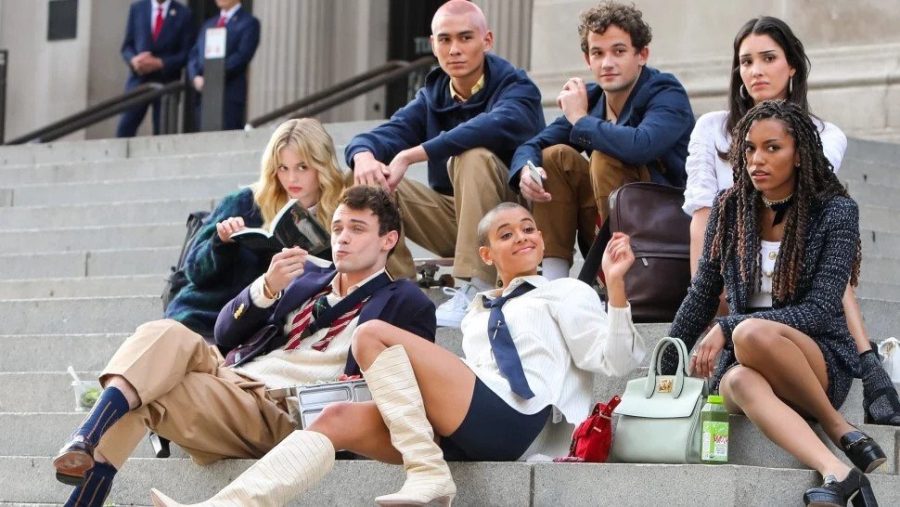‘Gossip Girl’ reboot’s second and final season feels elitist, but that’s the point
January 25, 2023
Fans know and love the iconic line, “XOXO, Gossip Girl,” and as the second and final season of the HBO Max reboot ends, viewers of the elitist, hyper-theatrical and equally raunchy teen drama cannot get enough of the whispers filling the halls of Constance Billard, New York City’s exclusive private school along Fifth Avenue.
With HBO Max announcing the show’s cancellation last week, the series finale of “Gossip Girl” becomes available Thursday at 2 a.m. on the streaming service.
Atop New York’s power circle, the series makes no attempt to hide the pretentiousness of its rich teen ensemble. Embracing each character’s spoiled status, the show’s writers poke fun at the top 1% and capitalize on the common fantasies of penthouse views and luxurious clothes.
In the original series, which aired from 2007 to 2012, Gossip Girl’s email and flip phone inboxes always overflowed. More than a decade later, the drama blogger wreaks havoc on the Upper East Siders through Instagram DMs instead. The reboot feels more in tune with modern teenagers’ lives, glued to their phones and waiting for the next rumor-spewing post.
Rather than remaining a mystery like in the first series’ run, the audience of the reboot know exactly who operates the now-Instagram drama account: Constance Billard teacher Kate Keller. Feeling disrespected by students and their parents, Keller secretly acts as the Instagram pariah. Aiming to improve the behavior of Upper East Siders, Keller goes up against more than the classic high school clique, including students like Julien Calloway, who sports influencer-level status, and Roger Menzies, a parent and Murdoch-like media executive.
Keller proves her unwavering faith in the page’s mission, refusing to surrender her identity even after a kidnapping. The writers do a respectable job in making the extensive hunt mostly engaging, despite its exaggerated nature.
Showrunner Joshua Safran, who also produced the original, earns props for not only modernizing the show, but also diversifying it in comparison to the original. Unlike its all-white predecessor, the “Gossip Girl” reboot features people of color and members of the LGBTQ+ community in some of its lead roles, which helped the show earn a 2023 GLAAD award nomination for Outstanding Drama Series. From being middle-class in a community of billionaires to experiencing shaky throuple dynamics and fighting to save a scholarship, “Gossip Girl” explores the ins-and-outs of a chaotic teenage life in a way that somehow feels relatable.
Notably, the glamorous aesthetics contribute to the show’s success — including Calloway’s glassy high-rise penthouse, Obie Bergmann’s timber-lined loft and a jazzy speakeasy. For better or worse, the students give fans something to dream about.
Following its July 2021 release, the show broke HBO Max records, with more than half a million viewers in four days. However, the twist of a teacher as Gossip Girl can only go so far. Upper East Siders’ attempts to uncover the Instagrammer’s identity somewhat drags on, and friendship dramas become stale, leaving the writers in need of a major shakeup they failed to deliver.
Showrunners admit finding a new home appears unlikely, which means the end of the road for the iconic franchise. Still, producers found a way to reinvigorate a show millennials revered into a cultural phenomenon spanning another generation.
4 XOXOs out of 5



